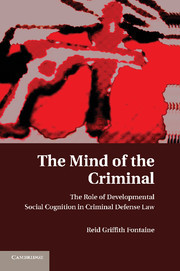Reid Griffith Fontaine is Assistant Professor at the Florida State University College of Law. Professor Fontaine has published numerous peer-reviewed scholarly and scientific articles on the development of social cognitive processing and antisocial conduct, which have appeared in many of the top behavioral science journals, including: Aggressive Behavior, Child Development, Development and Psychopathology, Developmental Psychology, Journal of Abnormal Psychology, and Journal of Abnormal Child Psychology. His scholarly writings on intersections of developmental and social cognitive psychology and public policy, jurisprudence, and law have been published in leading refereed interdisciplinary journals, such as New Criminal Law Review, the International Journal of Law and Psychiatry, and Psychology, Public Policy, and Law. In addition, two symposia on his scholarly writings on affirmative defense law have been published in the University of Michigan Journal of Law Reform and the American Criminal Law Review. Professor Fontaine received a Fulbright Senior Scholar award for the 2009–10 academic year, which funded his visiting appointment at the University of Rome.




